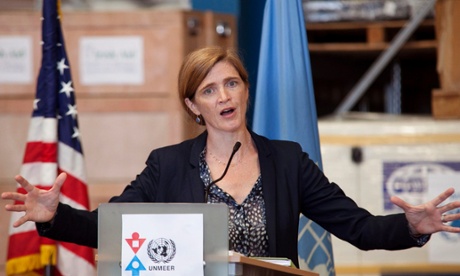Australian government has declined to send health workers to help tackle outbreak, citing inability to treat them if they contract the virus

With a US-managed field hospital days away from opening in Liberia, pressure is mounting on the Australian government to send health staff to the region to tackle the Ebola outbreak that has killed more than 5,000 people.
The 25-bed centre will treat international health workers who contract the virus and train them in how to manage it.
So far the government has refused to provide funding to send health workers to the region, citing concerns about evacuating and treating them should they be infected.
The shadow foreign affairs minister, Tanya Plibersek, who has been meeting officials in the US to discuss the global Ebola response, told the ABC on Friday morning the US field hospital would open within days and would provide treatment of a “first-world standard”.
“It was made clear to me that the facility would be made available for health workers, not just Australian, but health workers of any nationality who are in west Africa fighting ebola,” Plibersek said.
“Every meeting I’ve had here, whether it’s been with the World Bank, the United Nations, people within the White House or state department, it has been made clear to me that there is a strong view the the US, UK and to a degree, France, are bearing most of the responsibility for fighting this outbreak.
“There is a disappointment that countries such as Australia are willing to sign up to UN resolutions calling for people to do more by sending equipment and resources and so on, but then not willing to follow through.”
The president of the Australian Medical Association, Brian Owler, who has been urging the government to escalate its response for weeks, told Guardian Australia on Friday the government now had no excuse not to send health workers to west Africa.
“The excuse that we can’t adequately treat Australian workers doesn’t wash any more,” he said.
“It’s actually better to treat someone in-country rather than transporting them 30 hours to get home, which is logistically difficult.
“Now we know there are treatment centres being built we should send people because many health workers are ready and willing to go.”
There were about 19 existing treatment centres, some of which remained unstaffed, he said.
The government was shortsighted to focus its effort on preparing for an outbreak in the Asia Pacific region, Owler said.
“At this stage, if there was a regional outbreak we’d be looking to countries like the US and a whole bunch of other countries to contribute to our response,” he said.
“An outbreak in this region remains unlikely, but if it did occur, it would be good to have people on board who have received training and experience in west Africa.”
A Morgan Poll of more than 600 Australians has found 70% were in favour of sending doctors and nurses to West Africa to fight the epidemic, while 23% were opposed to it. The rest were undecided.
The Ebola outbreak is the largest in history, having killed almost 5,000 people and infected almost 15,000.
The World Bank has announced it will invest more than $100m to support foreign health workers heading to the region.
